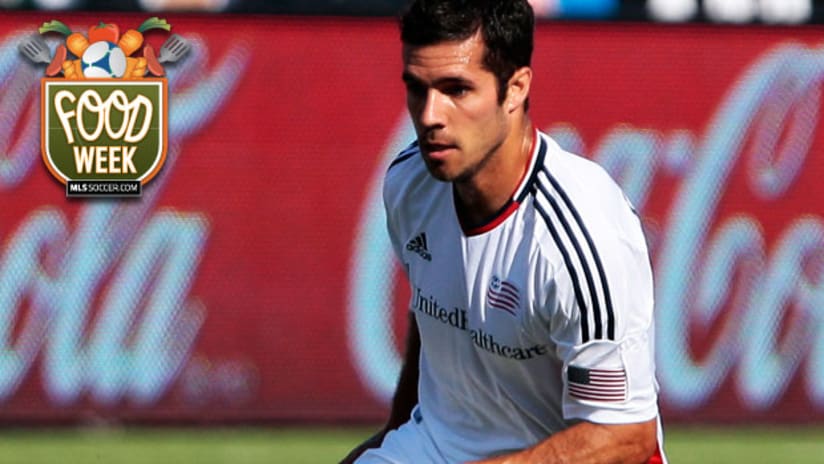Training meals aren’t what they used to be. Athletes at the ancient Olympic Games ate oxen and deer and drank wine. Competitors at the 1936 Berlin Olympics reportedly prepped for competition by eating up to three steaks, plus eggs and “meat-juice.”
Today, that type of protein-heavy diet is as outdated as competing in the buff. (Yes, they did that in ancient times.) And the old idea of “carbo-loading” is just as antiquated, at least for non-endurance athletes. The modern soccer player’s high-performance diet is balanced, combining measured ratios of complex carbohydrates, proteins and fats.
Sample Pregame Menu
(Kickoff: 8 pm ET)
<span style="font-size:10px;">Breakfast:<br>
8:30-9 am</span> |
<ul><li><span style="font-size:10px;">1 cup oatmeal</span></li><li><span style="font-size:10px;">1 cup low-fat milk</span></li><li><span style="font-size:10px;">2 tbsp raisins</span></li><li><span style="font-size:10px;">1 large banana</span></li><li><span style="font-size:10px;">8 oz. juice or fruit nectar</span></li></ul> |
<span style="font-size:10px;">Snack: </span> |
<ul><li><span style="font-size:10px;">1 granola bar (low fat, low sugar)</span></li></ul> |
<span style="font-size:10px;">Lunch:<br>
noon</span> |
<ul><li><span style="font-size:10px;">tuna-salad, ¾ cup (3 oz.) – light mayonnaise</span></li><li><span style="font-size:10px;">whole grain bread, 2 slices</span></li><li><span style="font-size:10px;">lettuce, tomato, pickles as desired</span></li><li><span style="font-size:10px;">3 slices avocado</span></li><li><span style="font-size:10px;">1 cup low-fat potato salad</span></li><li><span style="font-size:10px;">baby carrots, 1 cup</span></li><li><span style="font-size:10px;">fresh fruit</span></li></ul> |
<span style="font-size:10px;">Snack: </span> |
<ul><li><span style="font-size:10px;">½ cup cottage cheese</span></li><li><span style="font-size:10px;">½ cup fruit salad</span></li><li><span style="font-size:10px;">1½ ounces pretzels</span></li></ul> |
<p><span style="font-size:10px;">Pregame:<br>
4-4:30 pm </span><br></p> |
<ul><li><span style="font-size:10px;">Baked salmon 5 oz. </span></li><li><span style="font-size:10px;">1½ cup cooked brown rice</span></li><li><span style="font-size:10px;">1 cup asparagus </span></li><li><span style="font-size:10px;">tossed salad </span></li><li><span style="font-size:10px;">salad dressing, 2 tbsp (4 tbsp if low-fat) </span></li><li><span style="font-size:10px;">low-fat milk (or lactaid or soy), 1 cup</span></li></ul> |
Courtesy Alice Richer, RD
On average, a professional soccer player burns about 1,600 calories in a 90-minute match. That is more than 60 percent of the total recommended daily calorie intake for an adult male of average height and weight. In order to maintain their weight and also provide their body with the necessary energy, players generally eat between 3,000 and 4,000 calories a day.
“What you look at is: How depleting is the event?” says Dave Tenney, the Seattle Sounders’ head fitness coach. “How hard on the muscles is that event? What do you need to do to regenerate tissues and carbohydrate levels? That’s what determines the players’ intake.”
The typical MLS team’s pregame meal, generally eaten three-and-a-half to four hours before kickoff, is probably not all that surprising. It consists of a balanced mix of carbohydrates, proteins and fats: salad, vegetables like zucchini, sweet potatoes, and asparagus, whole wheat pasta, brown rice, roast chicken, salmon and fruits like apples, oranges and bananas. And, of course, plenty of liquids, mainly water and Gatorade.
“A pregame meal loads muscles with [energy] and stores carbohydrates in the gastrointestinal tract for absorption and release during exercise,” explains Alice Richer, a registered dietician and team nutritionist for the New England Revolution.
The speed at which carbohydrates — i.e., energy — are burned in the body often determines whether there is still something in the player’s tank in, say, the 90th minute of a match.
“In soccer, you need everything: speed, endurance, power,” says Tony Jouaux, strength and conditioning coach for the Chicago Fire. “So if you’re going to play the whole game, you need carbs, the main energy source. Then you need proteins because it repairs your muscles after the game. You need good fats to help reduce inflammation. And then you need vitamins, because some vitamins, like B vitamin, help to create energy.”
With all the emphasis on energy levels, there is an interesting — and potentially detrimental — phenomenon in soccer. Players don't like to take on "fuel" mid-competition.
Homecooking with Montreal's Zarek Valentin
“We don’t have a culture of fueling during the game,” Tenney says. "But there’s no way these guys have enough [energy] in them to last a whole game and keep powering through their sprints without supplementing at any given time.”
Amazing to think, no matter how far we've come from oxen and meat juice, there are still cultural norms that seem to defy science. Tenney has had some success getting Sounders players to consume quick-energy products, such as Gatorade Chews, at halftime, but he admits it's a struggle. His best argument in favor of it is to point to endurance athletes, like marathoners and triathletes, who frequently eat mid-competition. Ultimately, he hopes logic will win.
"It works," Tenney says simply.










